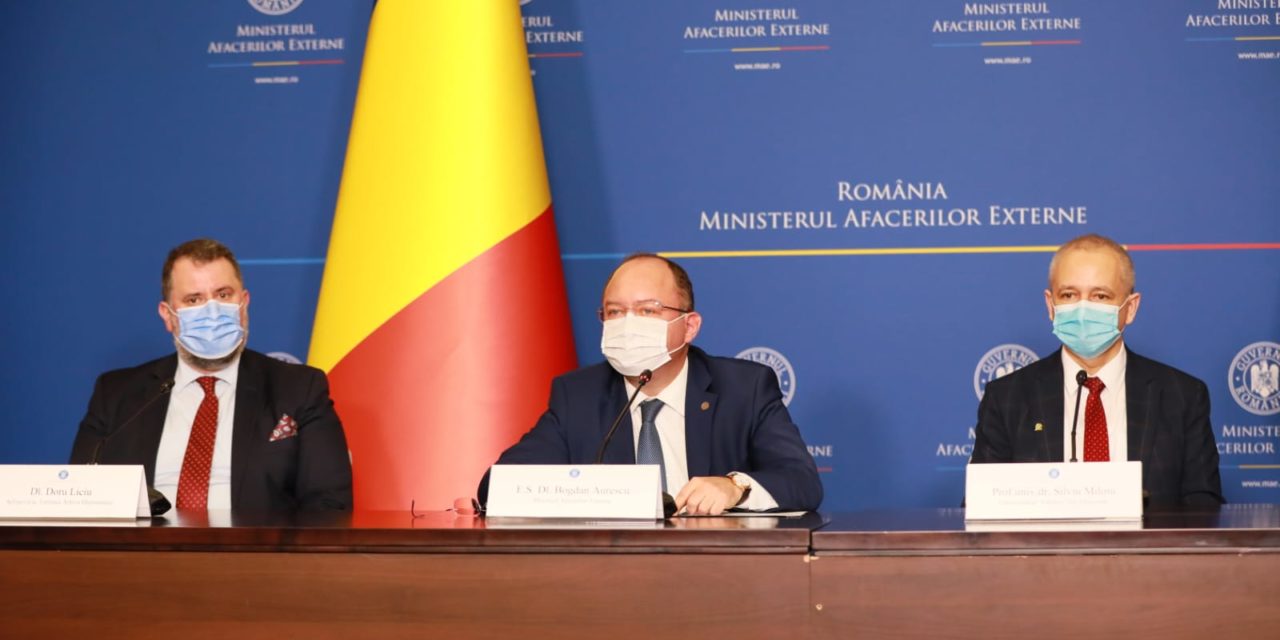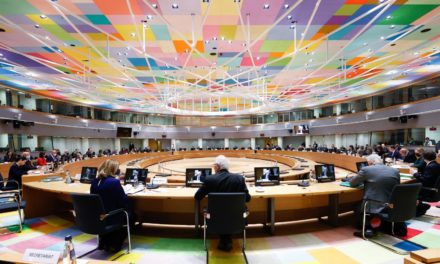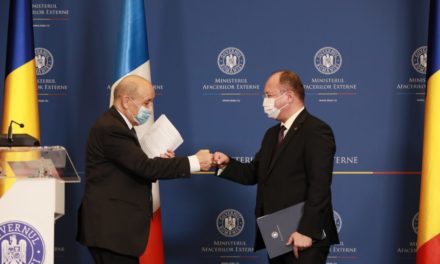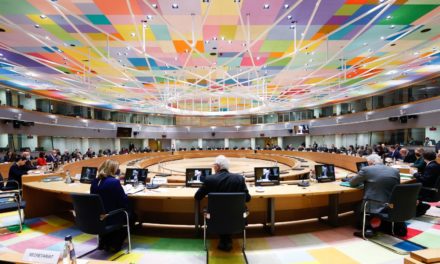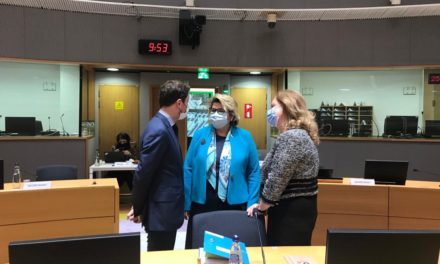Ministrul afacerilor externe Bogdan Aurescu efectuează joi, 14 aprilie 2022, o vizită oficială în Republica Macedonia de Nord, prilej cu care a avut o rundă de consultări politice cu ministrul afacerilor externe al Republicii Macedonia de Nord Bujar Osmani.
Agenda de discuții dintre cei doi demnitari a cuprins aspecte referitoare la consolidarea relațiilor bilaterale, cu accent pe intensificarea dialogului politic de nivel, creșterea și diversificarea cooperării economice, inclusiv a investițiilor și a schimburilor comerciale, și extinderea cooperării sectoriale dintre cele două state, precum și un schimb aprofundat de opinii asupra situației actuale de securitate, pe fondul agresiunii militare ruse în Ucraina.
Cei doi oficiali au reconfirmat, cu acest prilej, caracterul foarte bun al relațiilor bilaterale, precum și perspectivele de dezvoltare a acestora.
În cadrul discuțiilor, șeful diplomației române a accentuat importanța unei cooperări eficiente în ceea ce privește comunitățile înrudite și păstrarea identității lor culturale și lingvistice. A reiterat rolul-cheie pe care acestea îl joacă în menținerea unei relații profunde și durabile între România și Republica Macedonia de Nord.
Cu referire la agenda europeană, ministrul Bogdan Aurescu a reafirmat sprijinul ferm și constant pe care România îl acordă parcursului european al Republicii Macedonia de Nord. A subliniat, totodată, că Republica Macedonia de Nord este pe deplin pregătită pentru negocierile de aderare şi a asigurat interlocutorul de susținerea României pentru începerea, cât mai curând posibil, a acestora.
În ceea ce privește situația de securitate, ministrul Bogdan Aurescu a salutat măsurile ferme adoptate de Republica Macedonia de Nord ca reacție la agresiunea militară rusă din Ucraina, inclusiv alinierea în proporție de 100% la deciziile Uniunii Europene în domeniul Politicii Externe și de Securitate Comună, fapt care reconfirmă angajamentul ferm al Republicii Macedonia de Nord pe calea europeană.
Totodată, ministrul Bogdan Aurescu a exprimat sprijinul României pentru viitoarea Președinție în Exercițiu a OSCE, care va fi exercitată în 2023 de Republica Macedonia de Nord și accentul care este necesar a fi pus pe tema conflictelor prelungite.
Cei doi șefi ai diplomațiilor au semnat, la finalul consultărilor un Memorandum de înțelegere între cele două ministere ale afacerilor externe privind cooperarea pentru pregătirea diplomatică și un Aranjament Administrativ pentru Aplicarea Acordului între Republica Macedonia de Nord și România în Domeniul Asigurărilor Sociale.
Programul vizitei mai include primiri la Președintele Stevo Pendarovski, Președintele Adunării Parlamentare a Republicii Macedonia de Nord, Talat Xhaferi, precum și un prânz de lucru oferit de omologul macedonean, cu participarea Vice-prim ministrului și ministrului afacerilor europene Bojan Marichikj.
Prezentăm, mai jos, declarațiile de presă susținute de ministrul Bogdan Aurescu, la încheierea rundei de consultări:
It’s a real pleasure for me to be here today, in Skopje, at your kind invitation, dear Bujar. It’s great to be here and thank you for your kind hospitality and for the very substantial agenda that you have arranged for this visit.
We had very fruitful political consultations today, building on our last meeting, which took place in Bucharest, in December 2020, during your visit, and also following the very dense and frequent agenda of consultations between us in multilateral formats, on various occasions.
During our discussions today we assessed the current state of our bilateral relations, which are truly excellent. We are great partners in the North-Atlantic Treaty Organization, Romania is a firm supporter of the accession of the Republic of North Macedonia to the European Union and, at the same time, we are working very closely on various, very complicated issues.
We have discussed today in detail about how to counter the effects of the Russian illegal invasion in Ukraine and, in this context, I am glad that we were able to be helpful for the evacuation of citizens of the Republic of North Macedonia through Romania and also to be able host the Embassy of the Republic of North Macedonia from Kiev in Romania, at Satu Mare.
Indeed, this visit comes against the background of celebration, last year, of two important moments: the 20th the anniversary of the Political Treaty between Romania and North Macedonia, which I had the privilege to negotiate on behalf of Romania, more than 20 years ago; and, at the same time, the celebration of the signing of the Ohrid Agreement, which is also an important achievement for the Romanian Chairmanship-in-Office of the OSCE at that time.
Today we have discussed, of course, as far as the bilateral issues are concerned, not only on how to make our political dialogue even denser, even more frequent, but about enhancing our economic and sectorial cooperation. Indeed, if we take a look at the exchanges of last year, we see an increase already of 17,4%. I think we have to do more, because the potential of our economic relation is great, as we have witnessed recently from the contacts between our business communities during the business forum which was organized not too long ago.
The Republic of North Macedonia represents for Romania the second trading partner in the Western Balkans and it is an emerging player in this region. That is why we agreed to support the convening of the first meeting of the Joint Economic Commission between us as soon as possible this year. We have also discussed about various projects that we can support together, bilateral projects in areas like education, culture, energy, agriculture, tourism, home affairs – to mention just a few – and we have also discussed, of course, about how to make the connection between the two countries closer. In that respect, I think working on the direct flight connection between our capitals is a priority.
We have just signed, as my colleague, Minister Osmani said, a Memorandum of Understanding between our two Ministries of Foreign Affairs on diplomatic training, because the training of diplomats these days is more and more complex, challenging and multidimensional. We have also signed an Administrative Arrangement for the Implementation of the Bilateral Agreement on Social Security, which aims at improving the conditions for direct, people-to-people contacts between our countries, as well as for the business environment.
We also had an exchange on how to better support the role of our kin communities from both countries in building bridges between us, while joining efforts in the quest for ensuring the preservation of their cultural and linguistic identity.
Of course, as I have already mentioned, we discussed a lot about the security situation and the Russian illegal aggression against Ukraine and its consequences. We reiterated our strong condemnation of this aggression and of targeting innocent civilians.
It’s my duty to repeat that the war crimes and the crimes against humanity committed by the Russian forces in Ukraine should be investigated thoroughly and all those responsible should be brought to international justice and be held accountable. In this context, I have congratulated the Republic of North Macedonia and Minister Osmani personally for the swift and resolute measures adopted in reaction to the Russian military aggression and, in particular, for the full alignment with the EU decisions, in the field of Common Foreign and Security Policy, including on sanctions. This proves once again that the Republic of North Macedonia is reliable and its true commitment to the European path.
At the same time, we have discussed about the measures that we are taking within NATO, because we have had recently a NATO Summit, on the 24th of March; we had, after that, a meeting of the Foreign Ministers of the Alliance; and we are preparing for the decisions of the NATO Summit, in Madrid, in June. The illegal aggression of Russia against Ukraine has changed radically the security environment in Europe. It has affected not only the region, not only Europe, but also the Euro-Atlantic space as a whole and has also global projections. In this context, we have decided to create more Battle Groups on the Eastern Flank of NATO, including one in Romania. I invited the Republic of North Macedonia to consider the possibility of joining this Battle Group or the formations that will be created after the Madrid Summit. At the same time, we decided to accelerate the process of transformation of NATO as far as the posture of deterrence and defense on the Eastern Flank is concerned, in the long term, especially in the South, at the Black Sea, where Romania is located. In that respect, we have to work hard by the Summit in Madrid in order to shape the necessary decisions of the Alliance. I also stressed the importance of Allied resilience and I think it’s a good opportunity for the Republic of North Macedonia to join the Euro-Atlantic Center for Resilience, which is hosted in Bucharest, and to also make best use of the European Cyber-Security Center, which we are hosting in Bucharest – which is the EU Cyber Center.
Our talks also provided me the opportunity to reconfirm strongly the support of Romania for the European path of the Republic of North Macedonia. I think your country is fully prepared to start negotiations for accession and especially in this context of the illegal military aggression of Russia against Ukraine and it consequences, I think EU enlargement becomes more relevant than ever, because what we need is a stable and secure Western Balkans region. This is of strategic importance not only for the countries here, but also for the European Union as a whole. Romania was and will be a robust promoter of a credible EU enlargement policy and I would recall here the meeting which I co-hosted together with our Greek colleague, last year, in May, with all EU foreign ministers in support of the opening of the accession negotiations for the Republic of North Macedonia and Albania.
Against this background, we hope that a comprehensive solution to the current obstacles will be agreed soon and the Republic of North Macedonia can start the EU accession negotiations as soon as possible. Of course, this has to be joined by a continuous commitment of the reform process; it comes without saying, because accession negotiations mean, in fact, reform. We know it from our own experience of accession to the European Union and we are ready to provide all necessary support to our colleagues here, in Skopje, if they need it.
I’ve also expressed Romania’s support for the objectives of the Chairmanship-in-Office of the OSCE, which will be exercised by North Macedonia next year. I think it’s very important that a central place be granted in this mandate to the issue of protracted conflicts. We have all seen how a protracted conflict – the one in Eastern Ukraine – has become warm, hot, a conflict affecting the security of the Euro-Atlantic space as a whole. This Chairmanship is a clear recognition of the Republic of North Macedonia’s very constructive role in the stability and security of the region and beyond.
We have also discussed about the Republic of Moldova and I welcome the wish of the Republic of North Macedonia to also help this country in the process of coping with the challenges stemming from the Russian aggression in Ukraine.
In the end, let me express once again the satisfaction for the outcomes of our discussions today. We will continue, of course, our exchanges and let me reiterate, once again, Romania’s commitment towards an even stronger bilateral relation. So, dear Bujar, every success in your determined work towards achieving your country’s strategic, foreign policy objectives. Thank you!

